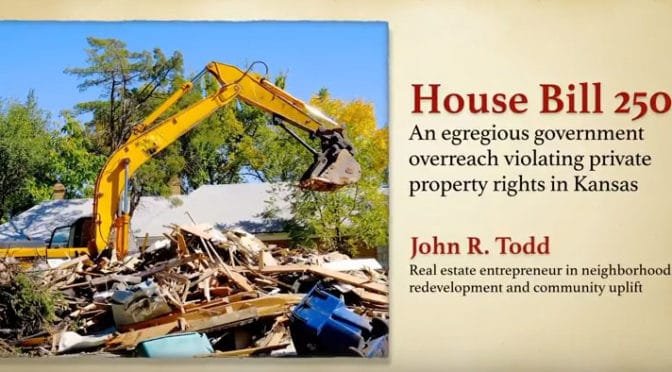Tag: Paul Soutar
-

From Pachyderm: Economic development incentives
A look at some of the large economic development programs in Wichita and Kansas.
-

Property under attack in Kansas
Local governments in Kansas are again seeking expanded power to seize property.
-

A National Perspective on Kansas Fiscal Policy
Jonathan Williams, Vice President in charge of the Center for State Fiscal Reform at the American Legislative Exchange Council (ALEC), spoke on “A National Perspective on Kansas Fiscal Policy.”
-

Wichita: A conversation for a positive community and city agenda
Wichita City Manager Robert Layton held a discussion titled “What are Wichita’s Strengths and Weaknesses: A Conversation for a Positive Community and City Agenda.”
-

Video: Jeffrey Tucker, ‘Bit by Bit: How P2P Is Freeing the World’
Jeffrey A. Tucker, Director of Digital Development at the Foundation for Economic Education, talks about his new book, “Bit by Bit: How P2P Is Freeing the World” in this presentation at the Wichita Pachyderm Club.
-
‘Trillion Dollar Economists’ presented
Last week Robert E. Litan delivered a very interesting talk to the Wichita Pachyderm Club. The talk was based on his recent book Trillion Dollar Economists: How Economists and Their Ideas have Transformed Business. View video below, or click here to view at YouTube. Video production by Paul Soutar.
-
Kansas and Wichita quick takes: Thursday May 17, 2012
Today: Watchdog reporter at Pachyderm; Kansas senators vote for cronyism; Koch = big oil?; Economic freedom; We aren’t Greece … yet.
-
Kansas and Wichita quick takes: Wednesday May 2, 2012
Today: When government pays, government controls; The moral case for capitalism; Moran to address Pachyderms; Funding pet projects without earmarks; Harm of taxes; Role of prices.
-
Federal, United Nations planning imported to Wichita
The Sedgwick County Commission has decided to give a consortium of South Central Kansas governments and organizations broad control over community planning funded by a federal grant and based on a United Nations agenda.
-
Occupy Koch Town protestors ignore facts
Occupy Koch Town protesters show no concern for facts or reason in their politically-motivated attack on Koch Industries, capitalism, and human progress.
-
Kansas and Wichita quick takes: Monday October 31, 2011
Today: Wichita City Council; Crony capitalism; Kansas pensions; Global economics to be discussed in Wichita; Progress, or not; Business and politics.